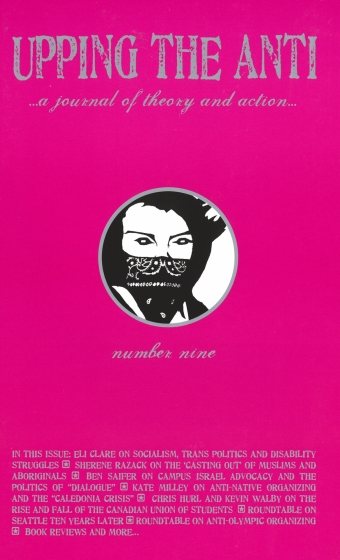Transcending our Excesses
Dear UTA,
In an effort to continue the dialogue that Heather Hax and etienne turpin initiated with their comments on the editorial in UTA 7, I’d like to make a connection between that editorial and the most recent one in UTA 8. In UTA 7, the editors adroitly note that “while capitalists seek to resolve the problem [of the inter-capitalist struggle for accumulation] by increasing efficiency, they always end by increasing overall consumption” (37). Although the point was to demonstrate how the logic of the system inexorably churns ever more of the biosphere through the productive system, it is equally important to note how the individual fits into this process. This allows us to close the labor-nature loop as, in absolute terms, it remains the laboring masses that consume the majority of capitalism’s output. Further, it highlights a fundamental component of capitalism and one of its ongoing contradictions: the need to reduce individuals to object-workers, breaking them down through Taylorist rationalization, while simultaneously appealing to their active participation as subject-consumers.
I would argue that this latter process is all about meaning, or what the most recent editorial refers to as “myths.” Although the editors spoke of grand justifying narratives that both provoke and divert revolutionary energies, myth is an essential feature of consumption. The significations of consumption are at least as relevant and prevalent in our day-to-day lives as those that establish our national identities, with considerable mutual constitution between the two as evidenced by “Buy American” sloganeering.
The constant growth in consumption is not a necessity of either human nature or biological need. It depends on the constant reconstruction of the systems of signification that give meaning to individual acts of consumption. In effect, it requires the constant production and reproduction of the capitalist individual. However, given that even strictly material objects, when subject to the manipulation of capitalist controlled techno-science, create unforeseen effects, the potential for constructing subjects in some given and predictable manner approaches nil. The only predictable outcome of the maelstrom of competing messages is a desire for more, the sine qua non of capitalism.
Cornelius Castoriadis has noted that above all, a social system must give our lives meaning; under capitalism this comes most immediately from consumptive practices. This is not to say that alienation is not a feature of consumption. However, even this has meaning: there can be no satisfaction of desire, only the creation of dissatisfaction following a temporary high. Thorstein Veblen long ago noted that ensuring the customer’s return requires promising much and delivering little. Any critique of this process must avoid falling into “dupes and dopes” perspectives that strip individuals of their agency or dismiss them as short-sighted and narrow minded; even radicals will understand and project themselves through their consumptive choices (hands up, who owns a Mac?). It is possible to recognize the importance of meaning without legitimizing either particular meanings or the consumptive practices of their realization.
The meaning that any social system, including capitalism, produces for the individual cannot be reduced to any instrumental or functional base. Therefore, merely transforming systems of production will not suffice to generate a decisive break with capitalism. We need to address what Castoriadis called the “social imaginary significations” of capitalism, which are ultimately rooted in the perceived centrality of production and consumption. Certainly turpin is correct when he writes, “the march of death will continue if our attention is not simultaneously oriented to the nature-labor relation and the radical transformation of the means of production this pairing demands” (15). But if we do not make a conscious effort to understand the significations associated with contemporary production, exchange, and consumption we will fail to ensure that new non-self-destructive meanings are produced to complement any altered system. In fact, we cannot produce one without the other. Above all ends, the conception of the economic as end rather than means needs to be displaced from its central position in our social conscience.
Marx believed that such a transformation of consciousness would come after the demise of capitalism. With the meeting of all basic material needs, individuals would be free to pursue lives of true freedom. However, degradation of the individual and nature cannot be overcome if we do not recognize Marx’s observation that “[it] is not the consciousness of men that determines their existence, but their social existence that determines their consciousness” as half right and half wrong: our consciousness and existence are constantly co-determined.
In the closing of the editorial in UTA 7, the editors note that “the knowledge gained through the domination of nature is the historical precondition to the elaboration of productive socio-natural syntheses” (45) and that the brutality of this history can only be redeemed through the transformation of production. The closing of the UTA 8 editorial declares “we must orient ourselves not toward that which we hope others will come to desire but rather toward the latent desires already in play” (43). The bridge between these observations is a need to build upon, extend and transform the meaning(s) we get from both production and consumption. Only then can we transcend our excesses, with their debilitating effects on us as workers and consumers and their despoilment of nature.
In solidarity,
DT Cochrane
Toronto

